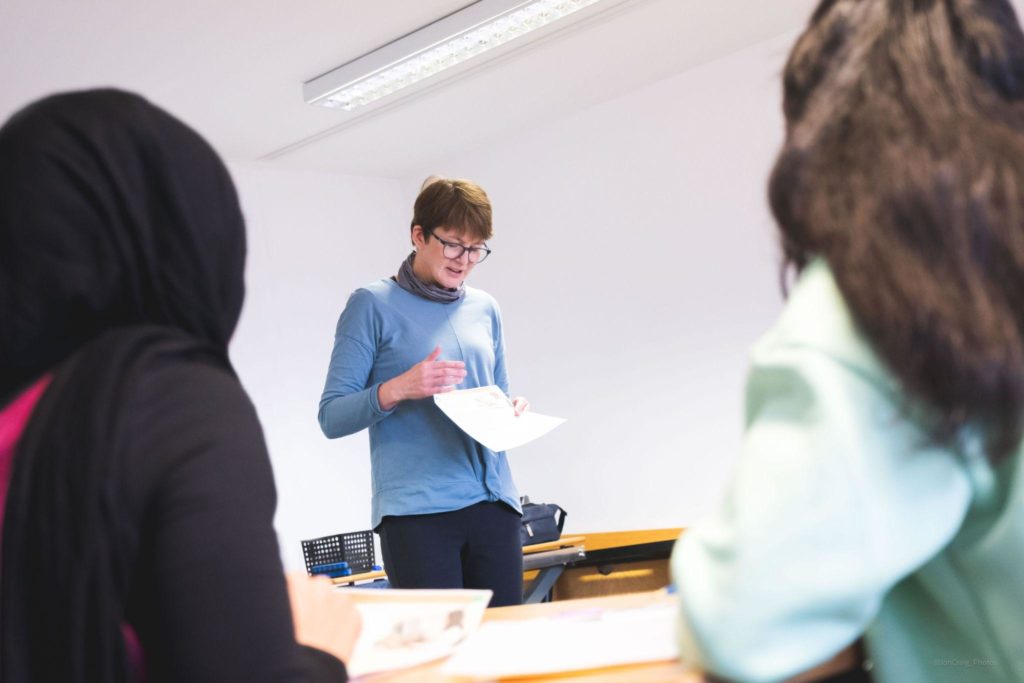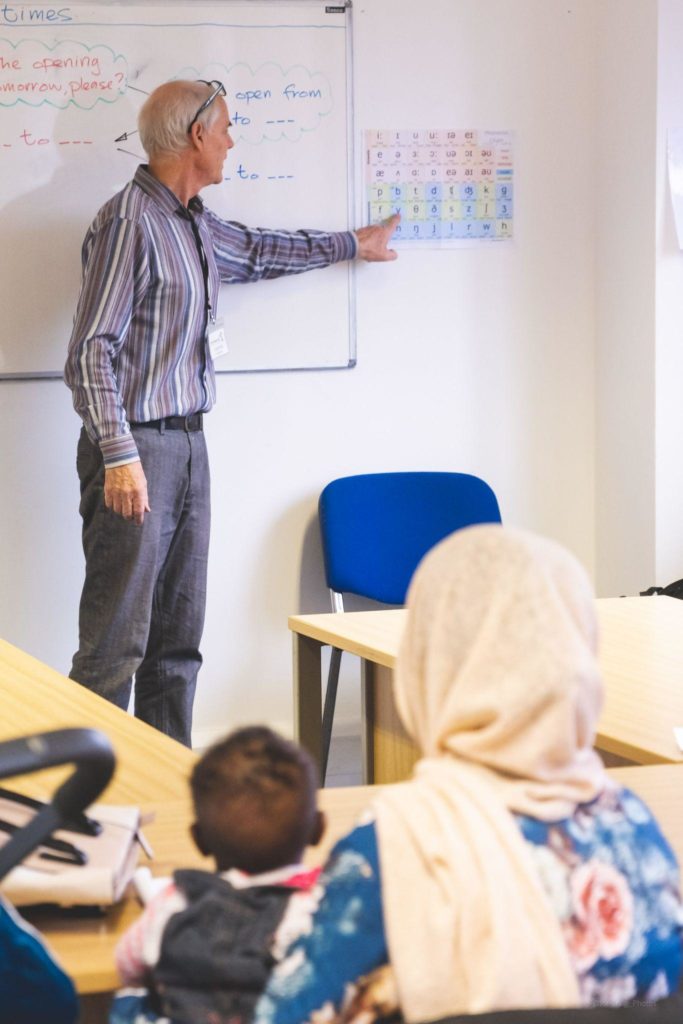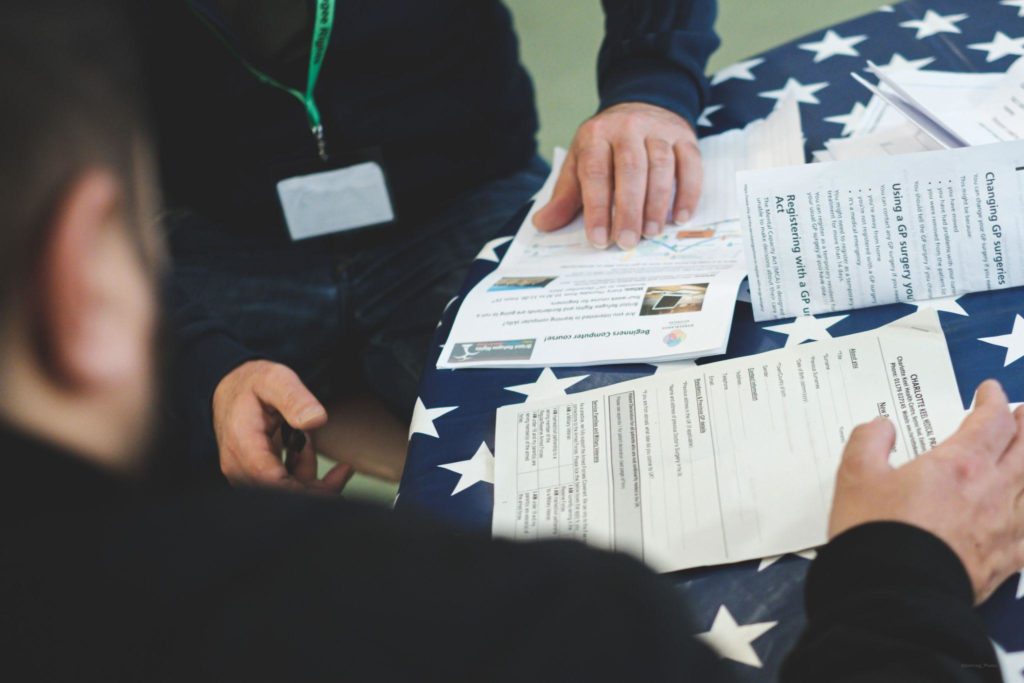A Story of our Education Services

BRR currently offers a range of English classes (Pre-entry Level to Level 2 and Entry Level 1 to Level 2) and helps to get places on ESOL courses run by other organisations. BRR also offers a weekly English conversation club in which members can practise having conversations in English. A total of twenty volunteers are involved in ESOL and Education offers with classes lasting between 5-8 weeks.
Thursdays at BRR
It’s a busy Thursday at BRR, the social drop-in is taking place at Wellspring Settlement. At one end of the room, one volunteer is playing scrabble against a member which is attracting a large group of people keen to learn some new words and chat with other members and volunteers. In the kitchen, two volunteers are making lunch for everyone while at another corner of the room a computer station has been set up. Andrew, the Welcome Team manager, is busy having one-on-one conversations with various members. Before the pandemic, the drop-in was a catch-all day where members could come to get high-level advice or socialise, whereas now members can go to the advice drop-in on Wednesdays and to the socialising drop-in on Thursdays. This freed up capacity and streamlined services meaning BRR’s teams are able to help members more successfully.
Every Thursday during the drop-in, long-standing volunteer Sue runs education assessments and registrations, in order to help decide which class is most appropriate for each new learner. After taking the member’s details, Sue begins the assessment by asking them to describe what they can name in a picture to see how much they already know and where they might struggle. At the end of the assessment, Sue asks the member what their aims are and if they would want to go to college later. As Steve, our Learning and Group Coordinator, tells me “That is the ultimate goal. We catch people when they are absolute beginners and fill a gap for people who struggle to access ESOL classes at the college. The aim is to be a pipeline for people to college, to support them and prepare them to access college long term”.
After the assessment, Sue decides on the group that matches the member’s level of English and availability, and checks if they need childcare to enable their attendance. Lack of childcare has been shown to be the key barrier to learning English as a foreign language and receiving statutory or institutional support, particularly for women, putting them at a disadvantage (Liebig 2019; Schiestl et. al. 2021). Therefore, BRR’s creche provides an opportunity for parents to receive support while their children are taken care of.
However, child care is only one of many barriers that asylum seekers may face when trying to access education and professional opportunities. One member who has attended the classes, tells me how he prefers ESOL classes at BRR because he is amongst other refugees and feels more understood. Sue tells me about how the people she meets here need understanding and flexibility because people seeking asylum often spend years in limbo waiting, unable to work and not having freedom of movement. Once someone is recognised, they often still face barriers in getting their degrees and professional qualifications recognised: “Imagine training for years for your job only to be told that you have to start from the beginning again. During the asylum process, people can’t get paid employment and when they do receive status, they often have to start from scratch again as their experience, all their education and hard work is often not recognised”. While volunteering cannot provide members with the financial independence that paid employment would give them, the numerous volunteer opportunities at BRR provides members an opportunity to gain experience that gives them a platform from which to access further education and employment opportunities.

Wednesdays at BRR
When visiting the Entry Level 1 classes on a Wednesday morning, I am greeted by Laurence, an experienced tutor who has been volunteering for 12 years as a language teacher for BRR. Laurence explains that a lot of his students struggle with speaking confidently when they first attend class. For him it’s important to create an environment where they feel comfortable to make mistakes and ask for advice. The classes help students drill down into the language, go back to basics to understand sentence construction and pronunciation, to give them the building blocks of the language and a safe space to practice. One student tells me how the class has increased her confidence: “Here I don’t need to be scared to talk, everyone is very nice”.
Another woman I talked to brought her baby along to the class as she couldn’t find childcare for this specific class. She felt relieved that the teacher understood her situation: “They understand, they don’t mind, they have patience”.
After the class, Steve tells me how important it is for BRR to run the English sessions flexibly: “We understand the difficulties our members face in their day to day lives which means they are often unable to attend regularly. With our classes they don’t have the added stress and pressure of attendance, punctuality and assignments as they would do at college. Inability to keep up with this regime and other issues such as cost and childcare can lead to our members being unable to attend in the first place or dropping out which is demoralising”.
Later that day, I joined the conversation club next door, which takes place every Wednesday afternoon. Entering the classroom, it’s noticeable right away that this group knows each other well and feel relaxed and comfortable around each other. In addition to the classes, the conversation club provides an opportunity for members to become more confident in speaking English casually and freely, in a comfortable and safe setting without fear of being judged.
I sit down next to Ayla, who tells me: “When I came here six months ago, I couldn’t speak anything, I could write and I could read but I couldn’t talk anything. Now I am confident and I can speak”. Val, a volunteer, joins our conversation and tells me that Ayla has now been facilitating and leading the conversation club, something Ayla tells me she could have never imagined doing just a couple of months ago: “I am usually a shy person and I used to feel very scared about making mistakes when I speak. But now coming here and being in charge of facilitating a discussion, I feel so confident and a bit proud”.
Today the session is led by another member, who starts the session by asking the group: “Tell us one thing you like about the culture here and one thing you don’t like?”
“I like how organised British people are”, says Saabih.
Another member, smiling, adds: “that’s true, in my country people are less organised but they are also more spontaneous which I miss sometimes”.
Those simple questions open up discussions about meaningful topics and are an opportunity for members to share their experiences about what it is like to be in a new country. Saabih tells me: “We discuss at our meetings different topics so it helps us understand the new culture and also other cultures. We all come from different cultures and are used to different socialising forms”.
Yusef, another participant from Lebanon, echoes a similar sentiment: “The best thing about coming here is to learn from others’ mistakes and also about our cultures”. He continues: “For me, language is not just talking, it’s about saying what I think, for sharing my opinions, for being able to be myself. It means everything really”.
At the end of the session, participants are asked if there is anything else they would like to share. One participant tells the group that she recently got into college with support from BRR.
by Maite Ibanez Bollerhoff, Monitoring and Evaluation Lead, Bristol Refugee Rights
August 2022
